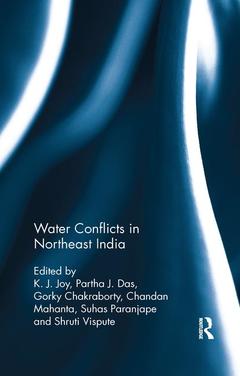Description
Water Conflicts in Northeast India
Coordinators: Joy K. J., Das Partha J., Chakraborty Gorky, Mahanta Chandan, Paranjape Suhas, Vispute Shruti
Language: English
Subjects for Water Conflicts in Northeast India:
Keywords
Idu Mishmi; water conflict; West Siang District; transboundary; environment impact assessments; Multipurpose River Valley Projects; Brahmaputra River Basin; ethnic and cultural issues; Barak River; seismic surveys; oil extractions; Arunachal Pradesh; hydro power; Civil Society; trans-national water systems; Brahmaputra Board; Northeast India; Hydropower Development; hydro-geology; Hydropower Projects; Himalayas; river systems; Churachandpur District; Partha J; Das; Teesta River; Gorky Chakraborty; Central Electricity Authority; Chandan Mahanta; Char Dwellers; Suhas Paranjape; Riverbank Erosion; Shruti Vispute; District Administration; A; C; Bhagabati; Mid-channel Bars; Runti Choudhury; Private Power Developers; Anjana Mahanta; Deputy Commissioner; Ghanashyam Sharma; Tipaimukh Dam; Trilochan Pandey; NHPC; Amelie Huber; Eastern Himalayas; Deepa Joshi; Brahmaputra River; Chandan Kumar Sharma; Yarlung Tsangpo; Nani Gopal Mahanta; Lower Subansiri; Sanjib Baruah; Siddhartha Kumar Lahiri; Sanchita Boruah; Partha Ganguli; Jinine Laishramcha; Raju Mimi; R; K; Ranjan Singh; Tseten Lepcha; Nimmi Kurian
Publication date: 03-2019
· 13.8x21.6 cm · Paperback
Publication date: 07-2017
· 13.8x21.6 cm · Hardback
Description
/li>Contents
/li>Readership
/li>Biography
/li>
Northeast India, apart from being the rainiest in India, is drained by two large river systems of the world ? the Brahmaputra and the Barak (Meghna) ? both transnational rivers cutting across bordering countries. The region, known for its rich water resources, has been witnessing an increasing number of conflicts related to water in recent years.
This volume documents the multifaceted conflicts and contestations around water in Northeast India, analyses their causes and consequences, and includes expert recommendations. It fills a major gap in the subject by examining wide-ranging issues such as cultural and anthropological dimensions of damming rivers in the Northeast and Eastern Himalayas; seismic surveys, oil extractions, and water conflicts; discontent over water quality and drinking water; floods, river bank erosion, embankments; water policy; transboundary water conflicts; and hydropower development. It also discusses the alleged Chinese efforts to divert the Brahmaputra River.
With its analytical and comprehensive coverage, 18 case studies, and suggested approaches for conflict resolution, this book will be indispensable for scholars and researchers of development studies, governance and public policy, politics and international relations, water resources, environment, geography, climate change, area studies, economics, and sociology. It will also be an important resource for policymakers, bureaucrats, development practitioners, civil society groups, the judiciary, and media.
List of Contributors, Foreword,Acknowledgements,List of Abbreviations1. Understanding Water Conflicts in Northeast India Part IFault Lines 2. Damming of Rivers and Anthropological Research: An Introductory Note 3. Water Quality in Assam: Challenges, Discontentment and Conflict 4. Harnessing Energy Potential in Fragile Landscapes: Exploration of Conflicts and Emerging Issues around Hydropower Developments in Sikkim 5. Hydropower Conflicts in Sikkim: Recognising the Power of Citizen Initiatives for Socio-environmental Justice 6. State Water Policy of Assam 2007: Conflict over Commercialising Water 7. Water Conflicts in Northeast India: The Need for a Multi-track Mechanism 8. Whose River is it, Anyway?: The Political Economy of Hydropower in the Eastern Himalayas Part II Case Studies 9. Conflicts over Embankments on the Jiadhal River in Dhemaji District, Assam 10. Riverbank Erosion in Rohmoria: Impact, Conflict and People’s Struggle 11. The Char Dwellers of Assam: Flowing River, Floating People 12. Seismic Survey for Oil Exploration in the Brahmaputra River Basin, Assam: Scientific Understanding and People’s Perceptions 13. Hydrocarbon Extraction in Manipur and Its Impact on Barak Downstream 14. The Dibang Multipurpose Project: Resistance of the Idu Mishmi 15. Tipaimukh High Dam on the Barak River: Conflicting Land and People 16. Hydropower Projects on the Teesta River: Movement against Mega Dams in Sikkim 17. An Uneven Flow? Navigating Downstream Concerns over China’s Water Policy
K. J. Joy is Senior Fellow, Society for Promoting Participative Ecosystem Management, Pune, India.
Partha J. Das is Head of Water, Climate and Hazard Division of Aaranyak, Guwahati, India.
Gorky Chakraborty is Associate Professor, Institute of Development Studies Kolkata, India.
Chandan Mahanta is Professor, Department of Civil Engineering, Indian Institute of Technology, Guwahati, India.
Suhas Paranjape was formerly Senior Fellow, Society for Promoting Participative Ecosystem Management, Pune, India.
Shruti Vispute is a doctoral student at the School of Geography, University of Leeds, UK.




